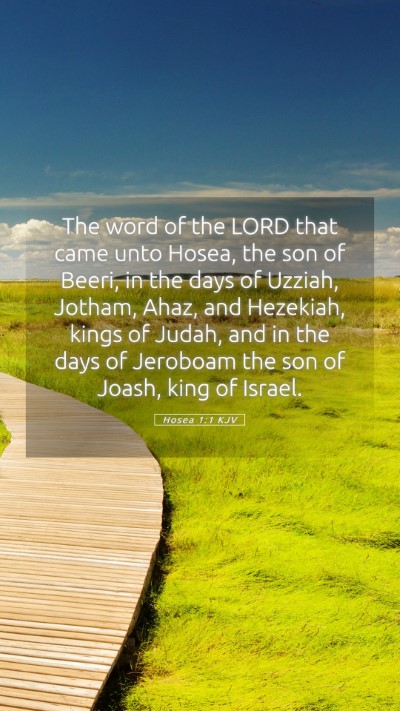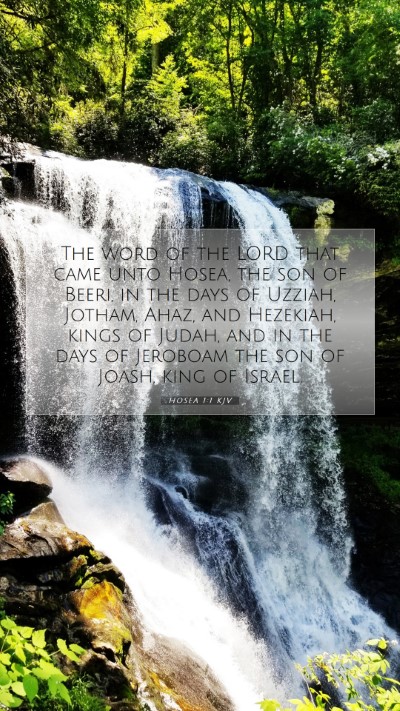Old Testament
Genesis Exodus Leviticus Numbers Deuteronomy Joshua Judges Ruth 1 Samuel 2 Samuel 1 Kings 2 Kings 1 Chronicles 2 Chronicles Ezra Nehemiah Esther Job Psalms Proverbs Ecclesiastes Song of Solomon Isaiah Jeremiah Lamentations Ezekiel Daniel Hosea Joel Amos Obadiah Jonah Micah Nahum Habakkuk Zephaniah Haggai Zechariah MalachiHosea 1:1 Meaning
What is the meaning of Hosea 1:1?
The word of the LORD that came unto Hosea, the son of Beeri, in the days of Uzziah, Jotham, Ahaz, and Hezekiah, kings of Judah, and in the days of Jeroboam the son of Joash, king of Israel.
Hosea 1:1 Bible Verse Meaning
Bible Verse Meaning of Hosea 1:1
Hosea 1:1 states: "The word of the LORD that came unto Hosea the son of Beeri, in the days of Uzziah, Jotham, Ahaz, and Hezekiah, kings of Judah, and in the days of Jeroboam the son of Joash, king of Israel."
This verse serves as an introduction to the prophetic ministry of Hosea and offers several layers of meaning and significance.
Contextual Background
The historical context is crucial for understanding the implications of this verse. Hosea prophesied during a tumultuous period in both the northern kingdom of Israel and the southern kingdom of Judah. The reigns of the mentioned kings—Uzziah, Jotham, Ahaz, Hezekiah in Judah and Jeroboam II in Israel—suggest a time of both political instability and spiritual waywardness.
Meaning of the Individual Elements
- The Word of the LORD: This phrase indicates divine revelation, emphasizing that Hosea is a messenger carrying God's message to His people. The term "word" indicates a specific communication that is to be taken seriously.
- Hosea: His name means "salvation," which ironically contrasts with the themes of judgment present in his prophecies; it foreshadows the redemption that ultimately follows.
- Sons of Beeri: This reference to Hosea's lineage roots him in a particular prophetic tradition and illustrates that God chooses individuals from ordinary backgrounds for His purposes.
- The Kings: Mentioning the kings provides a timeframe for Hosea's prophecy and indicates the sociopolitical climate of his ministry. The dysfunction and corruption of these kings often mirrored the spiritual failings of the nation.
Insights from Public Domain Commentaries
Matthew Henry’s Commentary
Matthew Henry emphasizes that the prophecy of Hosea marks a critical warning to Israel's disobedience and idolatry. He underscores that even amidst Israel's infidelity, God's word remained steadfast and accessible through His chosen prophets, thus portraying God's faithfulness contrasted against human waywardness.
Albert Barnes’ Commentary
Albert Barnes highlights the dual nature of the prophetic word presented by Hosea. He notes that it serves both as a harbinger of impending judgment and a promise of future restoration. This scripture grounds the spiritual condition of Israel in historical reality, illustrating how the kings’ actions directly influenced the people's spiritual state.
Adam Clarke’s Commentary
Clarke observes the thematic elements of sin and redemption present in Hosea's introduction. His detailed analysis points out that the phrase "the word of the Lord" asserts the authority of divine guidance over human leaders, reminding readers that regardless of political turmoil, God’s plan prevails.
Thematic Significance
Overall, Hosea 1:1 encapsulates the essence of prophetic declaration. It provides a foundation for understanding the gravity of Israel's situation while simultaneously hinting at hope for redemption. The mention of two kingdoms—Judah and Israel—signifies the divide and spiritual condition prevalent within God's chosen people.
Practical Applications
Readers can use this verse to reflect on the significance of prophetic voices in their own lives. It invites them to consider how they might heed spiritual guidance amidst the complexities of contemporary life and leadership. Through study and reflection on scripture, individuals may discover insights that apply to their circumstances today.
Cross References
- Isaiah 1:1: Context of prophetic mission in Judah.
- Micah 1:1: The word of the Lord regarding judgment.
- Amos 1:1: Another prophet addressing Israel's inequities.
- Jeremiah 1:1-2: Introduction of a subsequent prophet.
Conclusion
Hosea 1:1 serves as a pivotal scriptural entry point into understanding the themes of repentance, judgment, and eventual restoration embedded within the book of Hosea. For those engaged in Bible study or seeking Bible verse meanings, this verse illustrates the importance of both historical context and theological implications. Being a part of Bible study groups or utilizing Bible study tools can further enhance one’s understanding of difficult passages like these.


